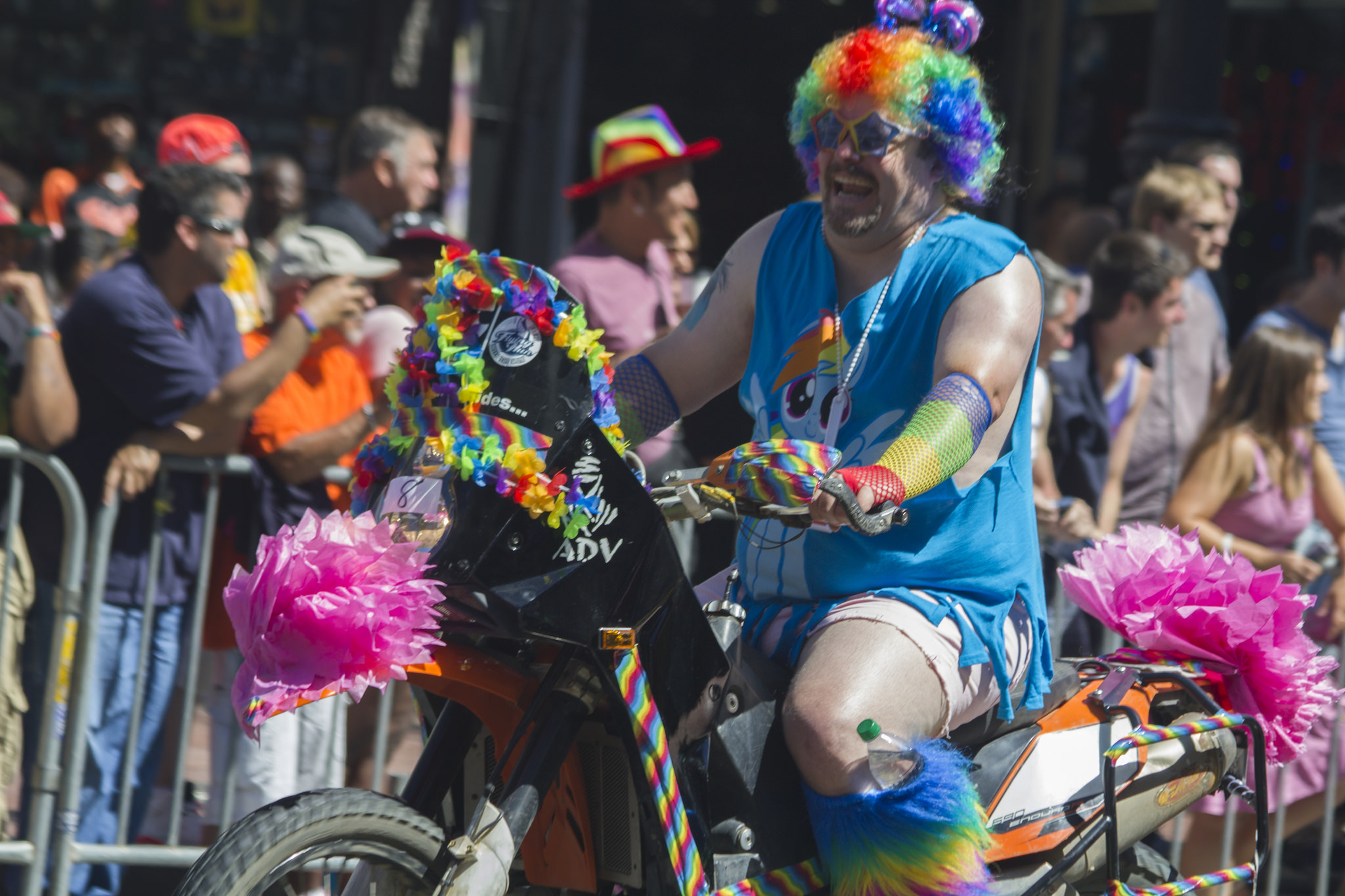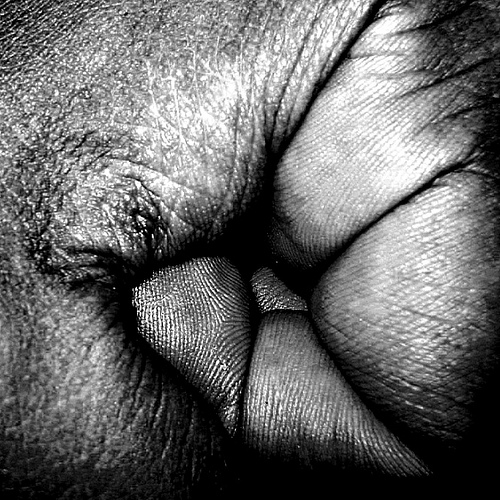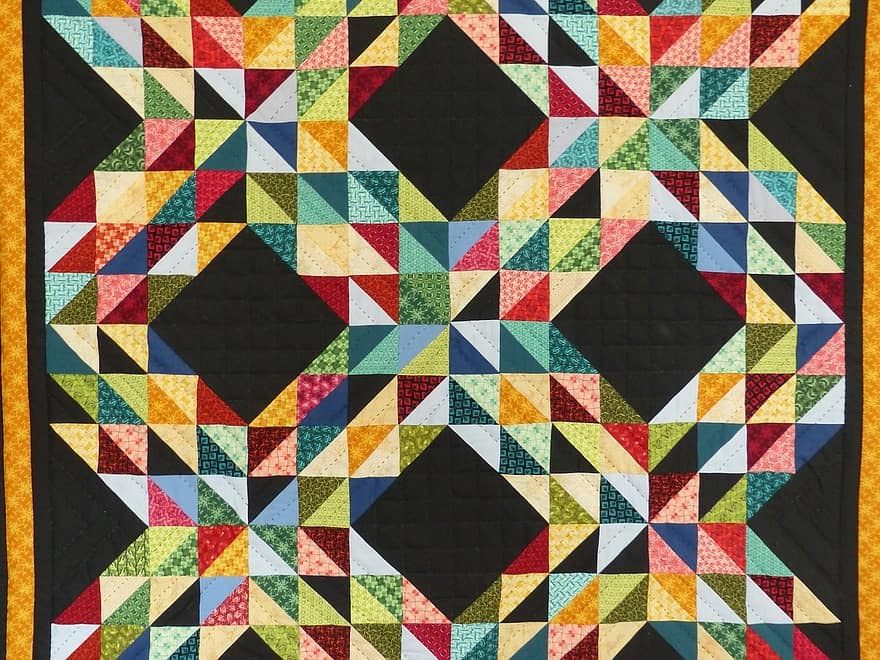From Barbie to G.I. Joe, American toy stores help to reinforce the socially constructed gender divisions between females and males. By separating and color coding aisles based on what is deemed appropriate for little girls and boys to play with, toy stores and toy companies help to entrench gender identities beginning from an exceptionally young age. An example of this marketing technique can be seen in the children’s franchise known as My Little Pony (MLP), which advertises exclusively to young girls through the iteration of everything a young female is supposed to be drawn to: long hair, pastel colors, cosmetics, and accessories shaped as hearts or butterflies. However, the popularity of MLP, which some see as a tool to enforce gender divisions, has inspired the rise of the Brony counterculture. Brony is a self-identifying term combining the terms “brother” and “pony.” Coined by adolescent and adult male fans of the animated series My Little Pony: Friendship is Magic, the Brony has attempted to construct for community of men who identify with MLP.[1] In doing so, Bronies intend to create a niche counterculture for men who feel marginalized by the social expectations of masculinity, where they can freely indulge in a franchise targeted to young girls. Bronies converge around MLP, building identities and communities with a collective of over seven million men in the United States alone.[2] These men could be labeled as being “strange” or “nerdy” for going against gender stereotypes, yet their effect on the fandom is far more insidious. By entering the MLP fandom, Bronies appear to be progressive in their attempt to defy a strict cultural formality of what is considered masculine and feminine. However, the Brony cult phenomenon houses an ugly underbelly on a Trojan Pony offering to the uniquely feminine MLP fandom space. The Brony is invading and manipulating a limited fandom space for girls and women by rebranding the innocent, benign object of the pony. In doing so, Bronies appear to be intentionally excluding the intended MLP audience from participating in physical fandom spaces such as websites and conventions. In this invasion, the Brony has created a harmful culture in which male entitlement is reinforced through the hypermasculinity and sexualization of My Little Pony.
Fandoms, defined as a community of fan members centered around a particular medium, should be inclusive to all yet, they are often exclusively controlled and marketed to male fans.[3] The idea of a “fan” has historically invoked the stereotypical image of a socially awkward, teenage boy wearing his pride on a trademark t-shirt.[4] This image is constantly used by the media, reiterating the male dominance present in fandoms and potentially deterring female members from joining these established fandoms. This stereotype can give the impression to male fans that they inherit control of their fandom spaces and must act as aggressive gatekeepers against “fake” fans, such as women.[5] It is estimated that girls now make up 15% of the entire MLP fanbase while men control a staggering 85% of that space.[6]
MLP focuses on the lives of six female friend ponies named Rainbow Dash, Twilight Sparkle, Fluttershy, Applejack, Rarity, and Pinkie Pie.[7] Each pony has a key character trait which includes magic, kindness, honesty, loyalty, generosity, and laughter.[8] Whenever the ponies encounter a problem they combine their respective traits to create an element of harmony, returning peace to the land of Equestria.[9] The separate character traits teach acceptance of differences, and the ponies’ ability to problem solve freely offers agency to seemingly delicate, female characters who could otherwise lose such power in other male-centric television programs.
Some Bronies see themselves as brave cavalry men fighting against preconceived notions of masculinity. They argue that, in MLP, the overpowering message is one of friendship between the female pony characters as they work to overcome challenges together. Bronies contend that this message can be beneficial and comforting to anyone regardless of age or gender, and that it just happens to be packaged into pastel ponies.[10] Many Bronies express frustration with the particularly feminine packaging, claiming that society’s strict gender division makes the show’s fandom inaccessible to them, as they are met with hostility from those who expect MLP to be exclusively for girls.[11] Ironically, the hostility the Bronies experience is reinforced by the Bronies, through their negative domination of the fandom space.
It is not a coincidence that a program with a positive message of unity and support among female figures is constructed within a context that would appeal to young girls. MLP is positive for young girls because its thematic messages, such as female empowerment, are supportive and emulate positive feminist ideals — which help promote a sense of community among the target audience. MLP functions to demonstrate to young girls how to embrace and use their differences to achieve goals in their own community. Some Bronies find the show inaccessible because they struggle to understand the feminine-oriented construct of the program. Bronies selectively choose to criticize American gender dynamics, by claiming to be victims of an ingrained masculine image. In the documentary, A Brony Tale, a particular Brony expresses how he and other Bronies feel trapped by the idea that men are: “supposed to chug beer, ride motorcycles, be degrading to women, and like explosions ” to truly be considered men.[12] Yet, they seek to counter this image by dominating and rebranding something that is supposed to create a positive outlet for girls who are also victims of gendered standards. By claiming to defy society’s idea of masculinity, Bronies ultimately end up overcompensating with a hypermasculine rebranding of MLP that moves the Brony sub-culture from harmless to harmful.
Bronies rationalize their fandom by explaining that they define themselves outside the traditional masculine role, and thus attach to the Pony symbol in order to express this. However, the behavior has become harmful to others in the space, as the Bronies have continued to show their affection for these ponies in extremely masculine ways. As the documentary A Brony Tale illustrates, Bronies occupy some of the most typically hypermasculine roles in society including mechanics, football players, bodyguards, weight lifters, military and fraternity members.[13] They pride themselves in their nonconformity, yet exhibit the same aggressive characteristics typically coded as male in society. Some Bronies have aggressively invaded a nurturing female space simply because they felt like victims of exclusion. Furthering this exclusion, they feel the need to beef up their own identities as MLP fans by adding the prefix “bro” to clearly distinguish themselves as male against the female fans. In doing so, they create and reinforce their own gender division within the fandom.
Once in the fandom, some Bronies demand control of the program and its feminist messages by altering its content through the creation of fan art, videos, and blogs that fit the Bronies’ hypermasculine interests. For example, A Brony Tale focuses on the particular representations of MLP in the subgroup of military Bronies. Some Brony fan art depicts innocent, pink ponies operating weapons of mass destruction and participating in violent warfare that is completely uncharacteristic of the ponies in the show.[14] One military Brony even had the image of a MLP character embossed onto his real-life rifle.[15] Bronies claim to agree with the friendly message of the show and purport to ignore the fact that this message is wrapped in pink ribbon, yet in reality they transform these characters, along with their messages of love and friendship, into vehicles for the Bronies’ own consumption.
This recontextualizing of MLP goes a step further in the oversexualization of the pony characters found in many Bronies’ fan art. While the show itself offers no suggestions of romantic or sexual situations, many Bronies have taken the liberty of adopting the innocent imagery of the pony and forcing it to become a sexual object that, at its extreme, partakes in and promotes sexual violence. The majority of this fan art can be found on the popular website known as 4chan, where the self-proclaimed Brony movement began in 2010.[16] The site’s appointed MLP section offers a great number of fan art and stories that depict the pony characters engaging in sexual and rape fantasies with male humans.[17] One such fan fiction series is titled, “Flutterrape,” a distortion of the pony named Fluttershy, and describes itself as, “lighthearted stories,” in which the ponies attempt to rape a male human living in the land of Equestria.[18] Through their fan art, these Bronies are placing MLP figures in a context that subverts the show’s positive themes with overt themes of sexual violence. This depiction of violence against female ponies further excludes female fans and denies them their right to a safe, nurturing space within their own fandom.
The existence of the Brony subculture is, in many cases, a manipulative contradiction that includes a supposedly feminist collective of men who seek to rebel against masculine, gendered standards in society by adopting a feminine symbol. Instead of a positive engagement with the community, many Bronies have infiltrated a fandom intended to support young girls and inserted hypermasculine images of violence and sexuality on intensely feminine figures. This invasion includes the use of self-identifying language, “Brony” to intentionally exclude girls and women from the fandom. Feminist, a term broadly defined as a worldview in which equality is granted regardless of how individuals identify or express their gender. The Bronies construct a pseudo-feminist facade to explain their association with MLP, when in reality they are exploiting the program in a way that is hypermasculine and contributes to the marginalization of women in fandom spaces.
In an ideal world, fandoms would represent a space that were inclusive to all ages and genders. If Bronies were truly interested in deconstructing masculine expectations and creating a healthy community for those who genuinely happen to enjoy MLP, they would identify with the entire feminine orientation of MLP and not distort the imagery for their own content purposes. They would also not identify exclusively as Bronies, which creates a gendered separation between the male and female fans of the show. If the Brony cause wants to be truly feminist and inclusive, then they should not distinguish themselves and reorient the MLP imagery. Harmful Bronies may have taken the reigns of control in the MLP fandom. However, female fans are still able to actively champion and protect the ideals inherent to the show for anyone who wishes to enjoy it — male or female.
[1] A Brony Tale, directed by Brent Hodge, (2014; New York, NY: Virgil Films, 2014), Netflix.
[2] “Herd Census and State of the Herd Report,” last modified March 20, 2014, http://herdcensus.com/generalsurvey.shtml.
[3] Jason Mittell, Television and American Culture (New York: Oxford University Press, 2010),
[4] Graeme McMillian, “Introducing the New Face of Fandom: Women,” Time, September 12,
2012, accessed October 23, 2014, http://entertainment.time.com/2012/09/12/introducing-the-new-face-of-fandom-women/
[5] McMillian, “Introducing the New Face.”
[6] A Brony Tale
[7] “Hasbro My Little Pony Friendship is Magic Ponies,” last modified 2014, http://www.hasbro.com/mylittlepony/en_US/ponies
[8] “Hasbro My Little Pony”
[9] Ibid
[10]A Brony Tale
[11]Ibid
[12]A Brony Tale
[13]Ibid.
[14] A Brony Tale
[15] Ibid
[16] A Brony Tale
[17] “4chan mlp-Pony,” last modified November 11, 2014. http://boards.4chan.org/mlp/
[18] “4chan mlp-Pony”



